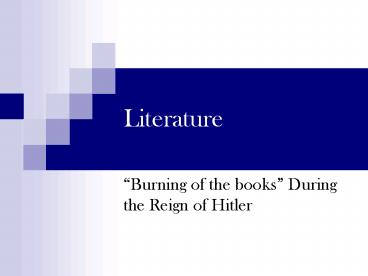Literature - PowerPoint PPT Presentation
1 / 11
Title:
Literature
Description:
In the 1930s and 40s, Hitler decided on the idea that any books that were ... German' books burned by Goebbels during the book bonfires at German universities. ... – PowerPoint PPT presentation
Number of Views:60
Avg rating:3.0/5.0
Title: Literature
1
Literature
- Burning of the books During the Reign of Hitler
2
Intro
- In the 1930s and 40s, Hitler decided on the idea
that any books that were thought to not
correspond with the beliefs of the Nazis were
considered immoral and corrupt. - When books are ordered to be collected by the
authorities and disposed of, it may not be just
the burning of books, but the destruction of
cultural and intellectual heritage.
3
- Students carrying banners toured the streets,
libraries, synagogues, and private homes. Works
of philosophers, rationalists, poets, and
internationally acclaimed authors, which had
until then been part of universal studies, were
thrown into the flames.
4
Destroying History
- May 10, 1933, German university students launched
an "Action Against the Un-German Spirit - Albert Einstein, Harvelock Ellis, Lion
Feuchtwanger, Sigmund Freud, André Gide, Franz
Kafka, Erich Kästner, Hellen Keller, Alfred Kerr,
Jack London, Heinrich Mann, Thomas Mann, Karl
Marx, Hugo Preuss, Marcel Proust
5
- Walter Rathenau, Erich Maria Remarque, Margaret
Sanger, Arthur Schnitzler, Upton Sinclair, Jakob
Wasserman, H. G. Wells, Stefan Zweig, and Emile
Zola. - These are just a few of the authors that had
their books burned and destroyed.
6
- This is a speech given to the participants during
the book burning by Reich Minister Dr. Goebbels - "My fellow students, German men and women, the
era of exaggerated Jewish intellectualism is now
at an end. The triumph of the German revolution
has cleared a path for the German way and the
future German man will not just be a man of
books, but also a man of character and it is to
this end we want to educate you.
7
- To have at an early age the courage to peer
directly into the pitiless eyes of life. To
repudiate the fear of death in order to gain
again the respect for death. That is the mission
of the young and therefore you do well at this
late hour to entrust to the flames the
intellectual garbage of the past.
8
- It is a strong, great and symbolic undertaking,
an undertaking, which shall prove to all the
world that the intellectual basis of the November
Republic is here overturned but that from its
ruins will arise victorious the lord of a new
spirit." (The Opernplatz in Berlin)
9
H.G Wells
- The 1930's found H.G. greatly disturbed by the
growing commotion of Nietzschean nationalism from
Nazi Germany and dictatorship in Italy. His
significant writings on the aggressive "Krupp cum
Kaiser" Imperial Germany joined with his outright
vicious attacks on Adolf Hitler and his
accomplices earned H.G. Wells the distinction of
having his "anti-German" books burned by Goebbels
during the book bonfires at German universities.
10
Fahrenheit 451
- Fahrenheit 451 is a science fiction novel by Ray
Bradbury that was published in 1953. The book is
a good example of The book burning that took
place in Berlin. The book is about a world that
is not open for change, and whose government has
ordered all books to be burned. In the book,
there are fire fighters committed to only
starting fires and burning books. Anyone caught
with books would be immediately taken to jail. In
some ways, the book is similar to what actually
took place.
11
Bibliography
- Found during computer lad, library or home.
- www.ushmm.org
- www.jewishvirtuallibrary.org
- www.wikipedia.org
- Where they have burned books, they will end in
burning human beings." (German "Dort, wo man
Bücher verbrennt, verbrennt man am Ende auch
Menschen.")Heinrich Heine, from his play
Almansor (1821)

























![[PRESENTATION] How to write literature review PowerPoint PPT Presentation](https://s3.amazonaws.com/images.powershow.com/9158769.th0.jpg?_=20181012061)





